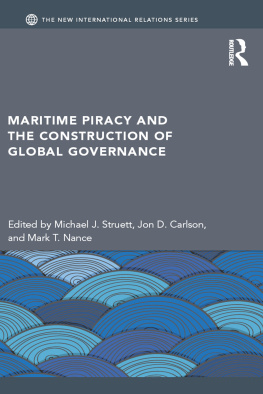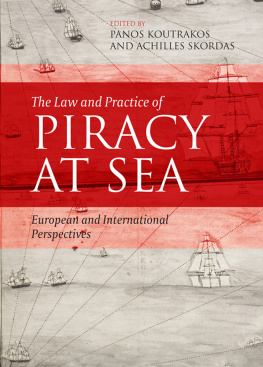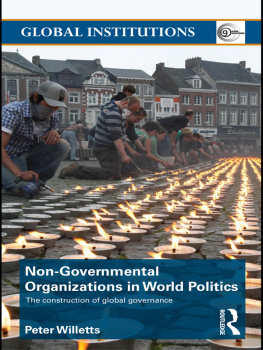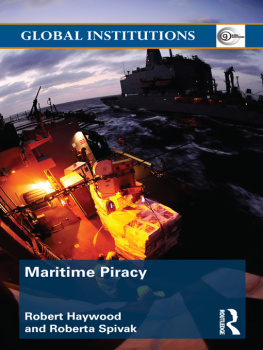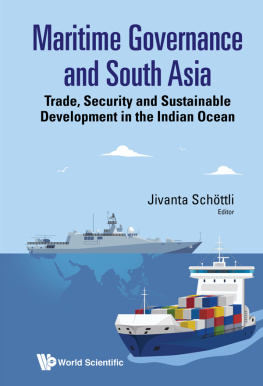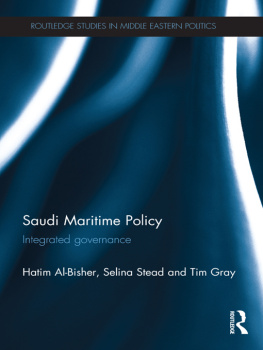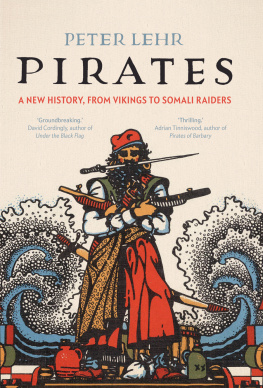Maritime Piracy and the Construction of Global Governance
Piratical attacks have become more frequent, violent, costly and increasingly threaten to undermine order in the international system. Much attention has focused on Somalia, but piracy is a problem worldwide. Recent coordination efforts among states in South East Asia appear to have helped in the area, but elsewhere piracy has expanded. Interestingly, international law has long recognized piracy as a crime and provided tools for universal suppression, yet piracy persists.
In this book, a handpicked group of leading experts in the field of International Relations use maritime piracy as a means to expose the incongruities in our understanding of global governance. Using broadly constructivist approaches to understand international actors responses to the challenges created by maritime piracy, the contributors question a number of myths and misconceptions around piracy and analyze the various ways that international law and organizations channel actors understandings of maritime piracy and their efforts to respond to it. In doing so, they expose some shaky foundations for IR theorists: how do we conceive of governance and legitimacy when they are delinked from the territorial aspect of the modern nation-state? What happens to prospects for cooperation when we get to the nitty-gritty questions of practice related to paying for trials, imprisoning and maintaining captured pirates, bearing the burden of policing sea-lanes, or even determining what constitutes a pirate? Does anyone have a monopoly on the legitimate use of force at sea, and how is that legitimacy constructed?
Maritime Piracy and the Construction of Global Governance offers an improved theoretical understanding of the response of the international community to maritime piracy and broadens our understanding of the complex and sometimes countervailing motivations of all the actors involved, from international organizations and states down to the pirates themselves.
Michael J. Struett is Associate Professor of Political Science in the School of Public and International Affairs at North Carolina State University, USA. Much of Dr. Struett's work focuses on the impact of non-governmental organizations in world politics, particularly the importance of their participation in processes of global governance.
Jon D. Carlson is Lecturer in Political Science at University of California, Merced, USA. Carlson studies International Relations, with a focus on political economy as it relates to globalization, development, and democracy.
Mark T. Nance is Assistant Professor of Political Science in the School of Public and International Affairs at North Carolina State University, USA. His research focuses on the impact of non-binding international institutions, particularly in international economic cooperation.
New International Relations
EDITED BY RICHARD LITTLE,University of Bristol,IVER B. NEUMANN,Norwegian Institute of International Affairs (NUPI), Norwayand
JUTTA WELDES,University of Bristol.
The field of international relations has changed dramatically in recent years. This new series will cover the major issues that have emerged and reflect the latest academic thinking in this particular dynamic area.
For a full list of titles in this series, please visit www.routledge.com.
The Politics of Regional Identity
Meddling with the Mediterranean
Michelle Pace
The Power of International Theory
Reforging the link to foreign policy-making through scientific enquiry
Fred Chernoff
Africa and the North
Between globalization and marginalization
Edited by Ulf Engel and Gorm Rye Olsen
Communitarian International Relations
The epistemic foundations of international relations
Emanuel Adler
Human Rights and World Trade
Hunger in international society
Ana Gonzalez-Pelaez
Liberalism and War
The victors and the vanquished
Andrew Williams
Constructivism and International Relations
Alexander Wendt and his critics
Edited by Stefano Guzzini and Anna Leander
Security as Practice
Discourse analysis and the Bosnian War
Lene Hansen
The Politics of Insecurity
Fear, migration and asylum in the EU
Jef Huysmans
State Sovereignty and Intervention
A discourse analysis of interventionary and non-interventionary practices in Kosovo and Algeria
Helle Malmvig
Culture and Security
Symbolic power and the politics of international security
Michael Williams
Hegemony & History
Adam Watson
Territorial Conflicts in World Society
Modern systems theory, international relations and conflict studies
Edited by Stephan Stetter
Ontological Security in International Relations
Self-Identity and the IR State
Brent J. Steele
The International Politics of Judicial Intervention
Creating a more just order
Andrea Birdsall
Pragmatism in International Relations
Edited by Harry Bauer and Elisabetta Brighi
Civilization and Empire
China and Japan's Encounter with European International Society
Shogo Suzuki
Transforming World Politics
From Empire to Multiple Worlds
Anna M. Agathangelou and L.H.M. Ling
The Politics of Becoming European
A Study of Polish and Baltic Post-Cold War Security Imaginaries
Maria Mlksoo
Social Power in International Politics
Peter Van Ham
International Relations and Identity
A Dialogical Approach
Xavier Guillaume
The Puzzle of Politics
Inquiries into the Genesis and Transformation of International Relations
Friedrich Kratochwil
The Conduct of Inquiry in International Relations
Philosophy of Science and its implications for the study of World Politics
Patrick Thaddeus Jackson
Arguing Global Governance
Agency, Lifeworld and Shared Reasoning
Edited by Corneliu Bjola and Markus Kornprobst
Constructing Global Enemies
Hegemony and Identity in International Discourses on Terrorism and Drug Prohibition
Eva Herschinger
Alker and IR
Global Studies in an Interconnected World
Edited by Rene Marlin-Bennett
Sovereignty between Politics and Law
Tanja Aalberts
International Relations and the First Great Debate

